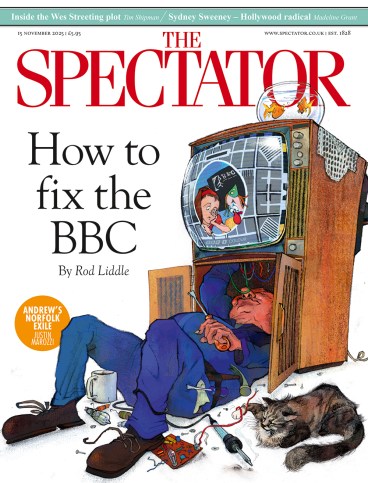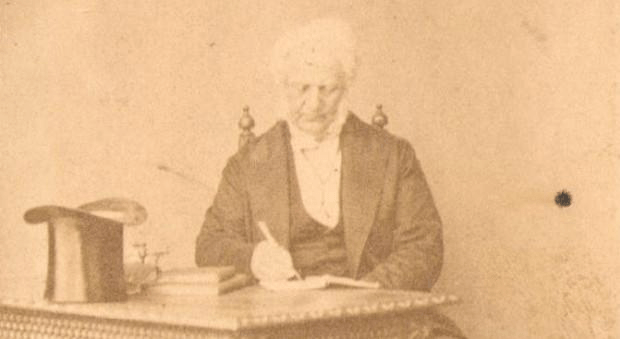
Queen Victoria began to experience dark visions after giving birth to her second child. Concerned that she might have inherited the madness of her grandfather, George III, Prince Albert summoned her doctor. Robert Ferguson was not the obvious man for this scenario – he was an obstetrician – but the doughty queen had heard that he ‘paid much attention to mental disease’, and willingly consulted him.
It wasn’t until 2009 that the precise nature of Victoria’s ‘mental disease’ came to light. Dr Ferguson’s diaries, formerly kept in private hands, came up for auction that year and entered the collection of the Royal College of Physicians. Their contents made for sad and startling reading. ‘By the one sense,’ Ferguson began of the 22-year-old queen, ‘she was deceived into the belief that she saw spots on people’s faces, which turned into worms, and that coffins floated before her, while with the other she heard words, always the same and always German.’
The doctor’s diaries were front and centre of Matthew Sweet’s sensitive but illuminating documentary for Radio 4. Various historians and psychoanalysts weighed in on the significance of the discovery and the light it sheds on Victoria’s postnatal depression. From Ferguson’s description, it seemed to me that she was experiencing these visions in waking life, but some of the contributors lent towards classifying them rather as dreams. Either way, they sounded nightmarish – the sort of images that might have inspired the art of Henry Fuseli or William Blake.
Sweet and his guests gave Victoria the full Freud treatment, explaining how restricted her childhood had been under the ‘Kensington System’ to which her mother – and more particularly her mother’s adviser and putative partner Sir John Conroy – subjected her. The young Victoria was so tightly monitored that she slept in her mother’s bedroom. The objective was to dampen her power by making her out to be an ‘idiot’ in the medical sense of the word. Given that background, you can’t help but admire her fortitude in divulging her psychosis.
Dr Ferguson came across in the programme as an unusually sympathetic soul with an excellent bedside manner. His diagnosis may have been dodgy – he attributed Victoria’s problems to her digestive system – but it was helpful insofar as she took comfort from it. I found her own comprehension of her troubles more enlightening. The worm imagery, as she understood it, derived from a troubling passage she had read in some memoirs of Louis XIV. It detailed an overturned urn containing a princess’s pickled organs and the stench they unleashed on an unsuspecting crowd. And thus, quite brilliantly, the documentary developed from a study of the diary to an illustration of psychoanalysis in progress 50 years before the word was coined. Bravo.
When it comes to self-analysis, poets take the crown. ‘Are you writing about the bin fire of your life?’ someone once asked poet-playwright Caroline Bird, who presented this week’s Sunday Feature on Radio 3. Bird is the author of seven successful poetry collections, but for the past two years, she has been in a funk. Her programme, When The Words Leave, was about poets experiencing writer’s block, only that is not a term that she or any one of the other poets interviewed like to use. ‘Creative silence’, ‘creative resistance’ and ‘white noise’ are preferred.
Being poets, they were able to explain what creativity and creative silence feel like in ways that lingered on the ears, not least because many of their metaphors and similes sprang from the radio. Creativity is ‘picking up all the frequencies’; its inverse, ‘static on the radio when you can’t find the channel you’re looking for’. New York poet Marie Howe described the block as feeling as though you’re in someone’s mouth being chewed, which sounded very Goya-like, and for the poet Jack Underwood, it was a dull manila envelope.
Some of the poets pointed to external causes for their malaise, such as an excess of criticism of poetry that is overly confessional when, in their view, all poetry is confessional. Others spoke of the difficulties of writing when there seems little point – the decline of readers, newspaper editors’ preference for binaries over muddying verse, and the world being on fire were cited as obstacles. It must, however, largely come down to how one processes these things.
This could easily have been a moany, self-pitying programme, but I found it surprisingly salutary. Writer’s block may simply be seen as one’s penance for being creative. Howe’s advice for carrying on observing even when one isn’t doing sounds about right. If that fails, we can only hope that Dr Ferguson’s diaries contain a prescription.







Comments